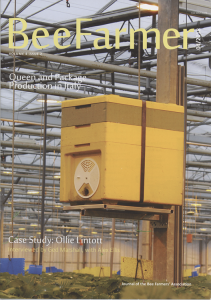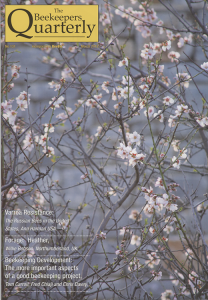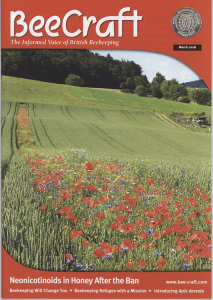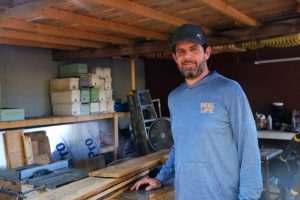
Ann Harman
Get it touch
ahworkerb@aol.com
By: Ann Harman
Just for fun, let’s move to a cottage just outside a village in England and have four hives of bees in the back garden. Keeping bees strong and healthy today is a challenge everywhere Varroa is found. Since the bees need our help we need to see what is available here to keep us informed on good beekeeping practices. It is also always fun to discover a nearby beekeeper and share information as well as “swarm stories.”
A good start would be to find if there is a local beekeepers association. There is one in the county! It’s the Northampton Beekeepers Association (NBKA). This particular association was started in 1882. That date is an indication that this area must be a good one for bees. Over 75 local associations exist all over England. It would be interesting to attend meetings at some other ones not too far away.
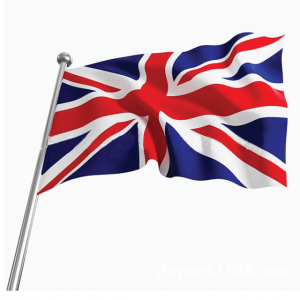 The NBKA meets on Saturdays. Their website (www.northantsbees.org.uk) provides a map as well as directions to the meeting site, the Abbey Baptist Church Centre. The club meets monthly (except for August). A look at their yearly programs shows a good variety of speakers and topics. The October meeting is an all-day affair with a Honey Show. That will be fun to enter.
The NBKA meets on Saturdays. Their website (www.northantsbees.org.uk) provides a map as well as directions to the meeting site, the Abbey Baptist Church Centre. The club meets monthly (except for August). A look at their yearly programs shows a good variety of speakers and topics. The October meeting is an all-day affair with a Honey Show. That will be fun to enter.
In addition to the regular meetings, you are encouraged to attend practical sessions at the Association’s apiary on Sunday mornings. The open-hive sessions start in early May and are held through the first two weeks in September. Training courses for both beginner and intermediate stage beekeepers are given. Many local associations have an apiary for teaching purposes and have similar courses. The NBKA newsletter is quarterly. A swarm retrieval list is available. The association has a library that lends beekeeping books to members.
Many other valuable bits of information are given on their website. It certainly looks like a very active bee association. A few things were mentioned in their list of speakers and topics that will need further investigation. One was the presentation at a meeting by a seasonal bee inspector. Another talk will be about the BBKA. One meeting program mentioned BIBBA. Information about these three items are necessary, especially the bee inspection.
The National Bee Unit (NBU) is part of a government department that covers England and Wales. It is involved with assisting beekeepers with control of pests and diseases. It has a legal duty to identify and deal with the two notifiable diseases in the UK, American and European foulbrood. Beekeepers are encouraged to sign up for BeeBase on the website where they can receive information about keeping healthy bees. In addition they will be notified of outbreaks of AFB and EFB or exotic pests in their area, The NBU has both full-time bee inspectors as well as seasonal ones. Beekeepers who suspect disease problems can request inspection. Beekeepers who have signed up on BeeBase will have their information recorded on their site for future reference. The NBU is now involved with the possible UK invasion of Vespa velutina, the Asian hornet that has caused severe honey bee problems in France and Spain. Beekeepers, as well as the public, have received publicity about this hornet so that any nests discovered can be destroyed. The NBU also has plans to deal with invasion of the small hive beetle and Tropilaelaps mites.
Honey bees have been an important part of British life for centuries. Although different stocks of bees are kept in England, the original one is Apis mellifera mellifera, sometimes called the Black bee since it is quite dark. It is the bee that was brought to America by the settlers. Some of the genetics remain in America’s bees today. In the UK this bee is being conserved and bred by members of BIBBA, Bee Improvement and Bee Breeders Association. BIBBA was formed in 1964 for the conservation, restoration, study, selection and improvement of native or near-native honey bees of Britain and Ireland. Near-native bees are ones that retain genetics of the Black bee but also have other bee genes.
The BIBBA magazine, Bee Improvement Magazine, is published for members about three times a year. A number of local associations called Groups are scattered around both England and Wales. The activities of these Groups include giving information on management of bees, queen breeding and distribution of breeding stock. BIBBA members are encouraged to use local stock for breeding. Workshops are held with both lectures and practical work.
A BIBBA three-day Conference is held biennially. One will be held this year, September 7-9, 2018. All beekeepers are welcome. Presentations, 45 of them, are divided into three categories: Bee breeding, bee improvement and queen rearing is one category. Another is on general beekeeping topics and the third is titled From Beginner to Intermediate. Attending the conference certainly would be a good opportunity to learn more about the Black bee.
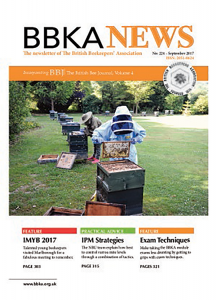 Now to see what BBKA is. Founded in 1874 the British Beekeepers Association is the principal national beekeeping association with about 25,000 members from all over the UK. These beekeepers are individual members of local associations that are affiliated with the BBKA. Being a member of the Association has many benefits; among them are a series of courses and exams, liability insurance, an annual convention, as well as a monthly membership magazine – BBKA News. If a local association is searching for a speaker, it can contact BBKA for their list of speakers. Schools and school children benefit from BBKA information packs for schools. The BBKA is also participating in the nationwide publicity and search for the Asian hornet.
Now to see what BBKA is. Founded in 1874 the British Beekeepers Association is the principal national beekeeping association with about 25,000 members from all over the UK. These beekeepers are individual members of local associations that are affiliated with the BBKA. Being a member of the Association has many benefits; among them are a series of courses and exams, liability insurance, an annual convention, as well as a monthly membership magazine – BBKA News. If a local association is searching for a speaker, it can contact BBKA for their list of speakers. Schools and school children benefit from BBKA information packs for schools. The BBKA is also participating in the nationwide publicity and search for the Asian hornet.
The one notable part of BBKA is the course of exams that beekeepers can elect to take and earn certificates. Although the syllabus was established many years ago it is always being updated to include information from new research. The many exams fit into different categories that beekeepers can elect.
In keeping with the BBKA’s interest in encouraging youth, if you are under 18 years old you can begin with the Junior Certificate. This exam consists of 10 minutes of oral questions and a short, written paper.
Then you must make a frame for a hive and present your beekeeping diary. The information needed in the diary can be found online.
No matter how long they have kept bees, all beekeepers will begin with the Basic Assessment. All the information needed to prepare for this and other Assessments (exams) can be found online (www.bbka.org.uk/learn/examinations). The requirements for the Basic Assessment are simple: you must have managed at least one colony for a minimum of 12 months. However, when you read through what you need to know for both the Practical and the Oral parts you will realize that you must be a well-informed beekeeper. The practical exam will not be given using any of your hives but will use one (or more) selected by the Assessor (examiner). The entire exam is not expected to exceed one hour.
This Basic Assessment has four parts: (1) Manipulation and Equipment: handle bees and equipment and describe what is observed. (You will be asked to take a sample of bees into a small container.) (2) Oral questions on Natural History and Beekeeping. (3) Oral questions on swarming, swarms, swarm control and effects. (4) Oral questions on diseases and pests. In this Basic Assessment scientific names are not required. In order to pass and receive the Certificate you must have 50% correct in each part.
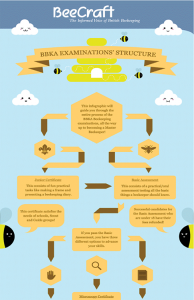 Once you have your Certificate in hand you have a choice of quite a number of other exams. Progressing through your choices can take as long as seven years. You can find details online at the BBKA site and on a useful infographic at www.bee-craft.com/bbka-examinations-structure/. Under the Qualified Beekeeper group of exams you will find Intermediate Theory, with its Modules or Modular Examination subjects. Written exams are given for all Modules. The General Husbandry Certificate is listed as a practical exam. From there you can progress to Master Beekeeper with its section of Advanced Theory containing all seven Modules and the Advanced Beekeeping practical exam. Booklets on the various subjects are available for study. You can purchase Past Paper Bundles from the Shop section of the website. The Bundle for each Module examination is a set of six papers for the past three years.
Once you have your Certificate in hand you have a choice of quite a number of other exams. Progressing through your choices can take as long as seven years. You can find details online at the BBKA site and on a useful infographic at www.bee-craft.com/bbka-examinations-structure/. Under the Qualified Beekeeper group of exams you will find Intermediate Theory, with its Modules or Modular Examination subjects. Written exams are given for all Modules. The General Husbandry Certificate is listed as a practical exam. From there you can progress to Master Beekeeper with its section of Advanced Theory containing all seven Modules and the Advanced Beekeeping practical exam. Booklets on the various subjects are available for study. You can purchase Past Paper Bundles from the Shop section of the website. The Bundle for each Module examination is a set of six papers for the past three years.
After passing the Basic Assessment you might wish to choose from four different separate Certificates: Honey Bee Health, Microscopy, Honey Bee Breeding, and Show Judge. The Show Judge group of exams has the choice of a written part with two Modules or the General Husbandry Certificate. You must also serve as a steward and a judge at specified shows. The Judges Record Book, kept over five years, is a necessary part of the exam.
If you have passed the Basic Assessment and wish to continue with only practical exams without written ones you can progress to the General Husbandry Certificate. You must have been beekeeping for three years.
You will have two Assessors who will come to your apiary and inspect it and your equipment as well as your honey handling equipment. You will then open one or more colonies for manipulation. In addition you will demonstrate a method of queen rearing.
The Advanced Husbandry Certificate, also a practical one, is especially designed for those beekeepers who wish to give presentations and demonstrations at meetings and conferences. The Assessment covers a number of different topics. One or more colonies of bees will be manipulated. A presentation of a practical topic will be given to an audience. Dissection for tracheal mites will be demonstrated, as will nosema analysis. The Queen Rearing exam will be both discussion and practical. Other tasks for this exam are listed on the website.
Having a beekeeping library is very important. So it is time to search for sources of bee books. Two excellent sources were found as well as some magazines. Northern Bee Books has a huge selection of both new and second-hand books on bees and beekeeping. Two magazines were listed: The Beekeepers Quarterly and Natural Bee Husbandry, both described as international English language journals. On the Northern Bee Books website you can sign up for The Bee eBook Paper to receive information about new books.
BeeCraft magazine is a monthly magazine with articles for all beekeepers. On the website you can view some free copies of complete issues. (www.bee-craft.com/see-inside-our-magazine/). As well as practical beekeeping articles, scientific presentations and interviews with interesting beekeepers, you will find news from the world in the section “Around the Colony.” Another section, “From the Lab.” gives the latest in bee research worldwide. “B Kids” consists of two colorful and attractive pages especially for children (of all ages!). Notices of forthcoming conferences encourage beekeepers to plan attendance. The magazine has excellent photographs illustrating important parts of the articles. After a tour of the free copies it is easy to see why the magazine has received six international medals for beekeeping journals.
BeeCraft also has a selection of very useful books and booklets, as well as the Apiary Guides. These Guides are on separate beekeeping topics and are designed to be taken to your beeyard to provide information when examining a colony of bees. Book topics include bee anatomy, diseases and pests, bee flowers, making mead, among others.
The scientific research part of beekeeping will be found at IBRA, International Bee Research Association. (https://ibra.org.uk/). The award-winning Journal of Apicultural Research publishes scientific papers on bee research from around the world. Another publication, Bee World, contains articles submitted from all over the world on honey bees, beekeeping and also on all other types of bees. IBRA also sells a wide range of books that include some on the history of beekeeping.
It is really a big world for beekeepers here in England. Associations, meetings and large conventions, ongoing research, helpful magazines and books, honey shows, beekeeping supply companies, short courses, and examinations to pass for Certificates!
Ann Harman has been all over the world teaching and talking about beekeeping. She makes her home in Flint Hill, Virginia.







